Click over to the UCG website and you'll find the following claim:
“We trace our origins to the Church that Jesus founded in the early first century.”
Oh really? How so?
There are two pathways “True Church” groups like UCG validate their ties to the early Christian church: one might be called the “remnant theory,” the other the “restoration theory.” Both are very different from the standard concept of "reformation."
The Remnant Theory is the usual one used by Church of God groups, and was inherited from Seventh-day Adventism. Basically the idea is that the True Church started out as pure as the new-driven snow, until the naughty proto-Catholics came by and led 99% plus away into horrible apostasy. There was a lost century, and when the curtain lifts we find the Trinity, bishops, monks, purgatory and fish on Friday.
There ensued "the lost century" in the history of the true Church of God. There was a well-organized conspiracy to blot out all record of Church history during that period. A hundred years later, history reveals a "Christianity" utterly unlike the Church Christ founded. (Herb Armstrong, The Incredible Human Potential, 5.)
However, so the theory goes, there was always a remnant who “held fast” against the Gates of Hell, tidily arranged into seven "eras" to go with the seven churches of Revelation. A particularly hilarious example of this sort of thinking came from Dugger & Dodd, who held that Ireland's Saint Patrick was actually a Sabbath-keeper. More usually the remnant were variously identified as Waldensians, Anabaptists and a variety of other persecuted minorities, ending up as Seventh Day Baptists who morphed into the Sabbatarian Adventists of the Church of God. So taught Ellen G. White, Dugger and Dodd, and Herman Hoeh.
The humble remnant of the Church of God listened to [Peter Waldo]. Soon many new disciples were coming to repentance. "His disciples became almost as many co-workers for him" (p.26). The world called them Waldenses. God's Church was again spreading the gospel! (Hoeh, A True History of the True Church, 22)
Unfortunately the facts keep getting in the way. For example the Waldensian Church still exists, but they don't much resemble the UCG. The “remnant trail” is fantasy parading as history, as is immediately clear to anyone who bothers to do a little digging. If UCG thinks otherwise, let's see the evidence, the learned articles in scholarly journals, the testimony of legitimate historians (sorry Bob, a degree in naturopathy doesn't really count.)
Theory two, the “restoration,” begins the same way. Everything is fine and dandy, but then Satan comes along and the True Church is extinguished. Popes and rosary beads flourish, incense wafts, but genuine Christianity is obliterated until... along comes a certain someone who is authorized to reboot the True Church after long centuries have passed. That's the path taken by the Mormons. God came along, revealed to Little Joe (Smith, not Tkach) that all the sects of Christendom were in error, then ordained Joe with the long forgotten priesthood offices and sent him forth to restore all things with the aid of magical spectacles.
Apparently that makes sense in Utah, but has never had the same clout in Church of God circles, although a certain Pasadena Apostle used to say that the "true gospel" hadn't been preached in over 1900 years (perhaps he hadn't read Herman's booklet properly.) It's possible Herb gravitated more toward restoration and away from the remnant theory as his megalomania grew.
So back to the the UCG's bold assertion. Where's the evidence?
The lads at Ambassador Bible Center spend a lot of time exploring obscure issues. Intellectual giants of the stature of Melvin Rhodes could doubtless help out by pointing us all in the direction of historically credible data to back up their claim.
Then again, maybe not. And if not, the honest thing would be to remove the statement on their website and confess that there is no direct connection.
Time to put up or shut up.
Showing posts with label Early Church. Show all posts
Showing posts with label Early Church. Show all posts
Tuesday, 17 October 2006
Friday, 6 October 2006
Junia not Junior
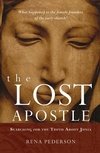
I suspect most readers of AW are blokes, judging from the gender balance of the comments. The old time WCG was a blokes' club with not just an all male ministry, but (and this was highly unusual) a preponderance of men over women in the general membership. This caused problems for the single men, exhorted to be maintain a high moral standard but unable to marry outside of their faith (and for most of the church's history outside of their “race” as well.)
Which is why most of the eligible bachelors scrubbed up with particular care for the Feast of Tabernacles. A chance to impress was too important to miss!
But what about the women? In some ways women have been the forgotten 50% of the Church of God. No women as preachers of course, no women as administrators, no women consulted when it came to the latest flip-flop over divorce and remarriage or make-up. For years even the by-lines in church publications were exclusively male, women apparently made inferior writers as well.
Today the new-look Tkach-WCG has, thankfully, made most of that history. They're even looking at the issue of women in ministry, though that reform is slow in coming, and you've got to suspect that, despite the advocacy of Sheila Graham and others, there is a lot of resistance. A cousin of mine, a fine and sincere man who has stood by the WCG through thick and thin, has written a paper opposing the idea.
So, let me introduce you to Junia, woman and apostle. Her story is a fascinating one. She's been hiding away in Romans 16 for nigh on two millennia, but precious few blokes seem to have noticed. Those that have, more often than not, have felt the need to perform gender reassignment: poor Junia has been shorn of her femininity and morphed into a man.
Check out Romans 16:7. “Greet Andronicus and Junia, my relatives who were in prison with me; they are prominent among the apostles, and they were in Christ before I was.” (NRSV)
Compare the same verse in the NIV where Junia goes under the knife to emerge as Junias, a male.
No, this isn't a trendy new feminist re-reading of the trusty old KJV, the KJV has Junia correctly identified, as did the early church fathers (mainly composed of misogynists who'd make Rod Meredith look positively enlightened by comparison.) Even Fred Coulter's translation (gasp!) gets it right - though I doubt he thought through the implications.
Junia, a woman who was “prominent among the apostles”? What gives?
Rena Pederson comes to the rescue with “The Lost Apostle: Searching for the Truth About Junia.” Pederson is a Washington journalist, not a theologian, and a “moderate Methodist”, not a COG member. Her book, however, illustrates the doggedness of a journalist who knows how to go after the facts, find the people “in the know” (she has interviewed a “who's who” of Christian scholars) and then present the findings in a highly readable, accessible way. I particularly enjoyed her account of meeting with a gaggle of Vatican scholars at the Pontifico Instituto Biblico:
"Surrounded by male scholars at the table, I had the feeling that this was what it must be like to have lunch at the Elks Lodge. I had envisioned a defensive or hostile reaction from the church scholars, but the institute professors exuded a gentlemanly curiosity about my topic. As it turned out, studying the women of the church was not high on their list of scholarly pursuits. It was like asking them what they thought about hormone replacement therapy."
You won't trip over theological verbiage, but you will get a fantastic insight into how women have fared in the Christian church down through the centuries, and who knows, just maybe you'll end up agreeing with Joe Jr. that the issue really does need addressing.
Agreeing with Joe about anything is a scary thought, but he's got to be right about something occasionally. And, just quietly, I think the various COGs would be much improved if some of the wooden-minded blokes stepped aside to make way for a few multi-tasking females. Any one of the service-minded secretaries who make coffee and clean up after Dave Pack would be a definite improvement, don't you think?
Tuesday, 4 July 2006
Polybabble
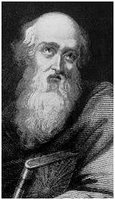
Bob Thiel responded to the Heavy Canon Fire posting by protesting loudly: "As far as those "mythical COG leaders of the apostolic age"--these leaders were NOT mythical. There is more information about some of them than there are about most of the early leaders in the Apostolic Succession lists of the Romans and especially the Orthodox."
Clicking across to Bob's list of apostolic COG leaders was enlightening. He starts off with the usual suspects: Peter, Paul, James & John. Uh huh. Well, let's be clear, every Christian sect claims these figures as their own.
Then Bob pulls together a list of early church luminaries who, in his view, are authentic COG Christians. They include Papias, Polycarp, Melito of Sardis and some more obscure names.
I realize that this won't be the most riveting subject for most readers, so to cut to the quick, there is absolutely no evidence that any of these characters championed COG distinctives such as the Sabbath (though Bob tries to prove otherwise.) The best he can do is demonstrate that they were 'Quartodecimans', keeping Easter on the Passover dates. Big deal, so did the entire Eastern Church at that time. Bob spins this by writing: Easter was not observed by the second century Christians in Asia Minor, such as Polycarp. He and others observed Passover.
No Bob. They kept Easter on the Passover dates.
Let's have a quick look at Polycarp. He was a bishop in Turkey. Bob desperately wants to COGgize him because he was, according to tradition, a disciple of John. That tradition is preserved by a bloke called Tertullian who was anything but a model of COG Christianity, and Irenaeus, another very unCOG-like character. Why would these Catholic apologists lend credibility to Polycarp if he was, in their view, a heretical COG leader?
Polycarp trekked his way to Rome to discuss the aforementioned dating of Easter with the Pope, and they parted amicably as brothers, agreeing to disagree. Bob concedes as much when he quotes Irenaeus: And in this state of affairs they held fellowship with each other; and Anicetus (the Pope) conceded to Polycarp in the Church the celebration of the Eucharist, by way of showing him respect.
Does this sound like a COG leader? Notice that Polycarp celebrated the Lord's Supper (eucharist) in Rome with the Pope's blessing. That'd be like Rod Meredith celebrating the mass in Saint Peters with Ratzinger looking on.
Apart from a letter addressed to the Philippian church, a few nice little anecdotes and a heroic tale of martyrdom, that's it! That's what we know about Polycarp.
So, how does Bob manage to shoe-horn him into the fictive pre-history of COGism? Beats me, and I've read his rather long treatise on the subject. According to Bob he even kept the Sabbath; here's his third proof:
His church reported about the him and the Sabbath.
Huh?
And now a little more from that treatise. You can judge its lucidity for yourself.
Polycarp is unique among any claimed to be a direct successor to any of the apostles. He is the only possible second century direct apostolic successor considered by any church I am aware that there was a letter written to him while he was alive. He is the only possible direct apostolic successor considered by any church I am aware that to have written any document that we still possess to this day (there is a letter claimed to have been written by Clement of Rome, however, it does not say that he wrote it, nor is Clement considered to be the direct successor of any apostle--the Roman Catholic Church claims that Linus was Peter's direct successor; there are also letters written by Ignatius of Antioch, but the two Antiochian Churches I am aware of claim that Evodius, not Ignatius, was Peter's direct successor). Polycarp is the only possible direct apostolic successor considered by any church I am aware that to have any document written about him within a few weeks of his death.
Anyone who can make sense of that paragraph deserves an advanced diploma in reading comprehension.
Saturday, 10 June 2006
Armstrongism in drag
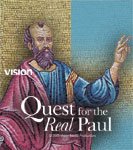
I finally got around to viewing the Hulme COG DVD on the apostle Paul today. David Hulme being the ex-WCG executive, ex-UCG president, currently High Poobah of his own splinter sect with an unmemorable name.
To give credit where it's due, the Lord's Anointed scrubs up well for the cameras. And he has a talent for slick PR. Hulme managed to enlist quite a lineup of experts for the program, including:
James Tabor (author of The Jesus Dynasty, former AC lecturer and a respected academic)
John Garr (spokesperson for something called the Restoration Foundation, author of several obscure books)
N.T. Wright (Anglican Bishop of Durham and British Evangelical poster-boy)
Paula Fredriksen (author of From Jesus to Christ and a very insightful commentator by anyone's standards)
John Gager (author of Reinventing Paul and a top scholar)
Craig A. Evans (another legitimate academic and author)
Amy-Jill Levine (who describes herself as a Yankee Jewish feminist, and specialises in feminist commentary on the Gospels)
Despite having all these knowledgeable people on call, along with some superb graphics, there was no disguising the fact that this was cold-COG leftovers reheated with a scholarly garnish. Hulme even trotted out the ancient Herbal chestnut about the missing decades in church history, and then the curtain rising on a new religion invented by the early church fathers (somebody should lock him in a small room with Jared Olar and a copy of Eusebius!)
It must be nice to fly around the world with a big, fat, tithe-funded media and travel budget, shooting backdrops in Antioch and posing casually in front of the Acropolis. And yes, the resulting 70-minute program looks as professional as money can buy.
There were moments of wonder. When the much maligned second century heretic Marcion was described as a Catholic bishop, for example. And when Dapper Dave stated that all adult converts to Judaism had to be circumcised (he seems to have forgotten about the 50% of the species who are female). While the experts (with the possible exception of Garr, whose credentials I'm unable to verify) said sensible things, Hulme himself was clearly on an apologetic mission for "God's law", the Sabbath and the "Church of God." Fair enough, but how on earth did he manage to convince N.T. Wright to play ball? "Excuse me Tom, but I run an exclusivist non-Trinitarian pseudo-Ebionite sect, and I'd love you to appear on a TV special I'm doing so you can make me look good..."?
Top marks for presentation, but a D for content (excepting the contributions from the scholars). Hulme is the COG leader who shows the most awareness of contemporary theology and church history, but Quest for the Real Paul amounts to little more than putting chocolate frosting on a very stale fruitcake called Armstrongism.
Sunday, 4 June 2006
Dr. Bob Bites Back
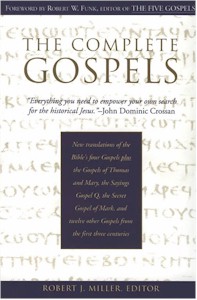
It was only a matter of hours before Bob Thiel responded to my previous entry. Courtesy of Gary Scott at XCG, the "Doctor Bob" posting attracted more attention than it otherwise might.
Bob points out that at least one of his articles is indeed extensively referenced, and I thank him for providing the link. What can we learn from Bob's selection of sources?
First, both Dugger & Dodd and the Catholic Encyclopedia were used, as predicted. The first dates back to the 1930s, while the second goes back nearly ninety five years. In fact, the bulk of Bob's references seem to be seriously dated. The earliest I noted was 1885! Most seem to be out-of-copyright material that is now available free online.
Then there are the "in-house" references: LCG booklets, Tomorrow's World magazine, one of Alan Knight's books (a hyper-fundamentalist COG7 lay member with, as far as I know, no qualifications whatsoever in this area), Samuele Bacchiocchi (who does) and the 1950s Radio Church of God Correspondence Course.
Remove the outdated stuff and the sectarian material and there's not a lot left. Even then, I wonder about some. For example Bob cites (approvingly) a passage from the Gospel of Thomas in The Complete Gospels, a volume published by the Jesus Seminar. Did he realize that?
Bob states: "My articles, as any who read them can tell, are highly documented." One article, especially with these kinds of references, is hardly convincing. Bob then switches tack and lambasts his critics: "it really does not matter much what the anti-COGers choose to believe about what I write. They have never appeared to me to be like the Bereans—they do not seem to have “searched the Scriptures daily to find out whether these things were so” (Acts 17:11)."
The question however is not whether his critics have read the Bible (I'm sure most of us have as good a track record as Bob) but how they read the Bible. Is it just a fundamentalist's treasure trove of proof texts (the way LCG seems to treat it) or something that requires a bit more thought and care.
Bob seems to have sidestepped my suggestion of providing a bibliography on the early church, but I'm happy to provide a brief one of my own. I've listed just 5, all of which concentrate on the first centuries. They come from a variety of perspectives, all the writers are qualified in their field, all are informed by the best current scholarship, and all (with the possible exception of Koester) are written for the non-specialist. Immerse yourself in any one of these, and I think you'll agree that Bob's apologetic approach leaves something to be desired.
Henry Chadwick. The Early Church. London, Penguin Books, Revised 1993. (A little staid, but quite comprehensive)
W.H.C. Frend. The Rise of Christianity. Philadelphia, Fortress Press, 1984. (Very comprehensive, widely regarded as one of the best)
Laurie Guy. Introducing Early Christianity. Downers Grove, Ill. InterVarsity Press, 2004. (An informed Evangelical perspective)
Helmut Koester. History and Literature of Early Christianity. Berlin & New York, Walter de Gruyter, 2000 ed. (More radical and densely argued than most)
L. Michael White. From Jesus to Christianity: How Four Generations of Visionaries & Storytellers Created the New Testament and Christian Faith. San Francisco, HarperCollins, 2004. (Brilliant overview)
Saturday, 3 June 2006
Doctor Bob

According to the latest Journal, Bob Thiel (PhD) has expanded his website to include a section on the Early Church in an effort "to portray Church of God history in a more documented and detailed light." Intrigued, as this is a particular interest I share with Bob, I clicked across to see what he had on offer.
What I found were scores of articles of - and this is my personal and somewhat biased assessment - dubious value and apologetic intent. But what really amazed me was that Doctor Bob was unable to provide a credible bibliography for any of it. No references (except for copious links to his other pages.) I don't claim to have seen everything he's written, so maybe there's an occasional mention of Dugger & Dodd or an online edition of the Catholic Enyclopedia somewhere, but overwhelmingly this is the sole work of one enthusiastic amateur with no specialist training in the field and little evidence of genuine research. But you can judge for yourself
Of course, I'm all for enthusiastic amateurs. Home gardeners for example, and an army of bloggers. But if you're going to set yourself up as an authority on early Christianity, let alone a prolific one, then you need to establish some basic credibility first. At a bare minimum you need to be well read on the subject; at least familiar with the state of the play. Simply regurgitating your own sectarian sources just doesn't cut it.
My challenge to Bob is to provide a bibliography for his site. Books he has actually read and consulted. Then we'll all be in a better position to discuss his ideas.
Monday, 22 May 2006
Putting the con back in Constantine

Was Constantine, the Roman emperor who legitimized Catholic Christianity, a good guy or a bad guy. The Da Vinci Code implies the latter, and there's a truckload of COG literature over the years that says much the same as Dan Brown. Constantine was, according to this analysis, either a highly savvy politician bent on manipulating the church to his own ends, or, to cite the most extreme option, a pawn of Satan who succeeded in derailing Truth.
Alastair Kee agrees. This Scottish Presbyterian theologian produced a thorough debunking of Constantine's "conversion" in a book called Constantine Versus Christ (1982). If you're interested in the subject, this is one study that's well worth digging up.
I mention this because the subject of Constantine came up in a recent church history tutorial. After a good deal of to-ing and fro-ing, the lecturer closed off discussion with these words of wisdom (which I'm paraphrasing):
"If we accept that Constantine was a bad man, and his legacy to the church was negative, we have to ask whether the Holy Spirit would or could permit such a terrible thing to occur. I think not."
Driving home that night I tossed that particular thought around. I don't know this man's denominational affiliation, but I assume it's something crashingly boring and conformist. These folk - unlike most readers of this blog - will have assumed that the acceptance of Christianity by the empire was a good thing. We of course, having been inoculated with multiple strains of heresy, know better. Being part of the modern Christian fringe gives one some sympathy for the underdogs of past ages. I find myself invariably rooting for the bit players in church history: Arians, Pelagians, Marcionites, all in the spirit of the bumper sticker that says "I support two teams, New Zealand and whoever is playing against Australia."
But there's a more important point than personal prejudices here. If we say that things can't go horribly wrong because of the Holy Spirit's guidance, then nothing can go wrong. Inquisitions, pogroms, crusades - no problem! If anyone is it blame it's the Holy Spirit. Oh wait, let's not blame the Holy Spirit (Matt.12:31)! No really, everything is just fine.
If that seems a perverse position, the dodgy recourse of wicked Popes and Patriarchs, consider for a moment how some of us responded (or failed to respond) during the last days of Armstrongism. The Pasadena apostle could do as he wanted (and make us do as he wanted) with a shake of his jowls and a threat of "not making it." The flock feared for their salvation if they were unconvinced. Jump? Yes sir! How high? How different is that from regarding Constantine and his episcopal buddies as the voice and choice of God?
I'm with Kee on this, even if it means gritting my teeth and also agreeing with Meredith & Co. Constantine was a shonky con artist who knew how to both flatter and coerce as circumstances required. The church however - or at least the part of it that the emperor adopted as his pet project - was hardly an unwilling partner, and anyone who thinks that slimey symbiosis was heralded with doves and haloes has "swallowed the Holy Spirit feathers and all" (as Luther is reputed to have said).
But lest we feel too smug, it pays to remember the spineless subservience of the dumb sheep to Apostle Herb and his enforcers in our own lifetimes.
Saturday, 20 May 2006
The Good News and Judas
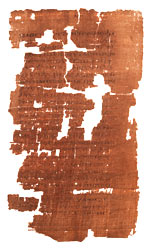
When the "James ossuary" story broke three years ago, The Good News, flagship publication of the United Church of God, was quick to join the credulous throng of ecstatic apologists. The problem is that stories which seem too good to be true usually are. Although the ossuary still has its defenders, a deep suspicion has since fallen over the authenticity of the artifact.
Contrast the cries of "hosanna" at the appearance of the ancient bone box with the chilly reception the GN team has dished up for the Gospel of Judas. Where the ossuary seemed to confirm Bible believers in the historical accuracy of their faith, Judas threatens to raise impertinent questions and unpleasant facts. But never fear, the GN has it covered!
According to the May/June 2006 issue, the Gospel of Judas was written a century or two after the death of Jesus. It serves "no useful purpose for Christians," and contains "bizarre philosophies" along with "strange and antibiblical beliefs." It is, we're assured, "the product of a strange sect" (!) and "contradicts the record of the authentic gospels..."
Although the Good News report shows the cover of the book published by National Geographic, it seems unlikely any of the lads in Cincinnati have got around to actually reading it. Let's tackle the issue of the dating of Judas for example. While the codex containing Judas dates from the 300s, we know that it has been around since at least 180. That's when one of the earliest "Church fathers," Irenaeus, mentioned the existence of the Gospel. To be widely known in 180, it had to have been around for quite a while. One suggested date is 150, which would make it contemporary with the latest of the New Testament books, 2 Peter.
Of course, nobody is seriously suggesting that Judas preserves an accurate historical account of events. It's a tale told from the perspective of Christians who were ultimately excluded from the emerging Catholic faith. And what makes an "authentic" gospel authentic in the first place? The question of how the canon was formed has always been an Achilles heel for fundamentalists who find fault with church tradition, yet somehow rely on it when it comes to what they accept as scripture.
This is amply demonstrated in the very same issue of the GN, where Don Hooser tackles The Da Vinci Code. In a section called "Truthful Quotes from The Da Vinci Code," Don takes a sideswipe at "mainstream Christianity" and the emperor Constantine. But, hang on a minute Don, why is Constantine a bad guy and Athanasius (who lived at the same time, supported Constantine and brought together the New Testament canon in its current form) a good guy?
Early Christianity basically split three ways. The Jewish Christians, led by James, continued to observe the Sabbaths, circumcision and temple rites. The Catholic Christians took a more radical, inclusive course. And the Gnostic Christians, taking Paul's teachings to an extreme (or perhaps their logical conclusion) meshed their faith with the philosophies of their time and society. The Jewish church and the Gnostics lost the battle for Christian ascendency. Every existing Christian denomination today - including the Sabbath-keeping churches - is descended from the Catholic party that adopted the present canon. Most Jewish Christians rejected Paul's writings. The Gnostics had documents which they regarded as authentic, but because they were such free spirits (in contrast to the hierarchical Catholics) its difficult to generalize about which books they prefered. It's likely that the Gospel of Thomas was more popular, for example, than Judas.
But, mindful of the way "strange sects" operate, the facts are unlikely to make much difference to the editors of the Good News.
PS. My own thoughts on whether the Gnostics were really Christian can be found here
Subscribe to:
Posts (Atom)
